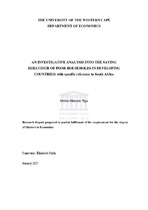| dc.contributor.advisor | Stoltz, Elizabeth | |
| dc.contributor.author | Nga, Marie-Therese | |
| dc.contributor.other | Dept. of Economics | |
| dc.contributor.other | Faculty of Economics and Management Sciences | |
| dc.date.accessioned | 2013-09-11T12:32:28Z | |
| dc.date.available | 2007/09/21 14:51 | |
| dc.date.available | 2007/09/21 | |
| dc.date.available | 2013-09-11T12:32:28Z | |
| dc.date.issued | 2007 | |
| dc.identifier.uri | http://hdl.handle.net/11394/2081 | |
| dc.description | Magister Economicae - MEcon | en_US |
| dc.description.abstract | In South Africa, as in many developing countries, most households are poor and do not save, as a result of which they do not acquire any positive net worth and which also constrains access to formal means of finance. South Africa is a consuming nation, with increasing ratios of household consumption resulting in dissaving and often unsustainable levels of household debt, which is also stimulated by the current lower level of interest rates. This situation is worse amongst poorhouseholds who also often experience financial shocks, for instance because of the death of family membersas a result of HIV/AIDS. This report provided an overview of household saving in South Africa for the period 1983 to 2003. It identified the main factors responsible for the lack of a commitment to saving which are particularly relevant in the case of poor households. | en_US |
| dc.language.iso | en | en_US |
| dc.publisher | University of the Western Cape | en_US |
| dc.subject | Personal finance - South Africa | en_US |
| dc.subject | Savings and thrift | en_US |
| dc.subject | Money - South Africa | en_US |
| dc.subject | Saving and investment - South Africa | en_US |
| dc.title | An investigative analysis into the saving behaviour of poor households in developing countries: with specific reference to South Africa | en_US |
| dc.type | Thesis | en_US |
| dc.rights.holder | University of the Western Cape | en_US |
| dc.description.country | South Africa | |

